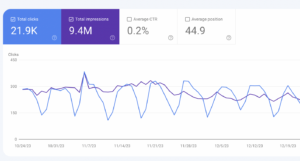What is Technical SEO?
Technical SEO refers to website and server optimizations that make it easy for search engines to crawl and index content.
The foundation of a search engine strategy starts with Technical SEO. It allows for your website to be accessed by search engines so that customers can discover your content.
The scope includes the management of elements like Crawling, Indexing, Status Codes, Page Speed, Content, Site Structure, Mobile Usability, SSL, Structured Data, Migrations, and Rendering for websites.
Another way to think of Technical SEO? Hakuna Matata. In the Lion King Hakuna Matata means “no worries.” In SEO, it means no issues with your website.
By ensuring that your website is problem free, Technical SEO clears the way for your content to thrive and organic search traffic to increase.
Why is Technical SEO important?
When a graph goes like this…
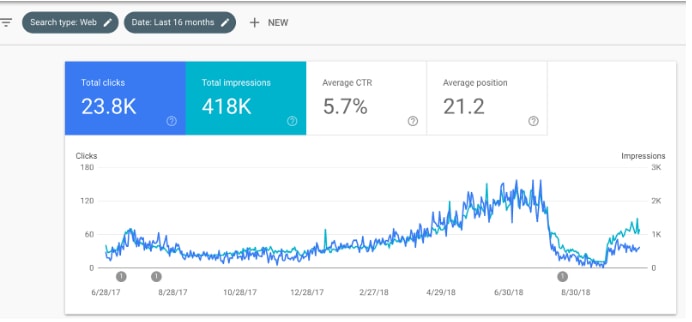
…Technical SEO diagnoses the issue and implements the solution.
Technical issues vary. At best, technical issues result in missed opportunities to communicate information to customers and search engines. At worst, technical issues make your site completely inaccessible to search engines, invisible to customers, or both.
Here are some important things to know about Technical SEO.
- Helps search engines access, understand, and index content from a website
- Refers to both website and server optimizations (which impact site speed)
- Common technical mistakes can impact many or all pages of a website
- Ongoing – it takes time to diagnose issues, implement solutions, and measure the impact
Users and search engines dislike websites with issues. Technical SEO addresses and fixes those issues.
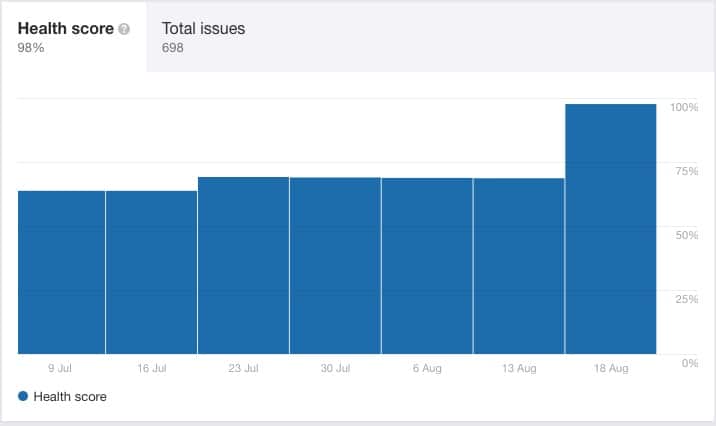
How can you improve Technical SEO?
The road to improvement starts with a SEO audit. Every website is unique, and to improve, a SEO company will need to identify issues that pertain to your website.
What is in a Technical SEO audit? Some of the main components include:
- Accessibility (Website Performance)
- HTML Tags
- Content Quality
- Crawling & Indexing
- Other items like Mobile, Internal Links, External Links, Rendering, and Structured Data
The process of an audit begins with a “crawl” – a request to analyze all the accessible urls of a website.
Upon completion you will receive an audit report, website health score, and insight on key issues like accessibility.

Within the details of the audit is a list of the actual issues your website has. By issues, we’re referring to the mistakes a site audit reports based on data received when crawling the site.
There are different issues within an audit. There are errors, warnings, and notices.
Errors are at the top of the list of priorities. Warnings do not necessarily require fixing, but still may be worth attending to. Notices are worth looking into, but are low priority on the to-do list.
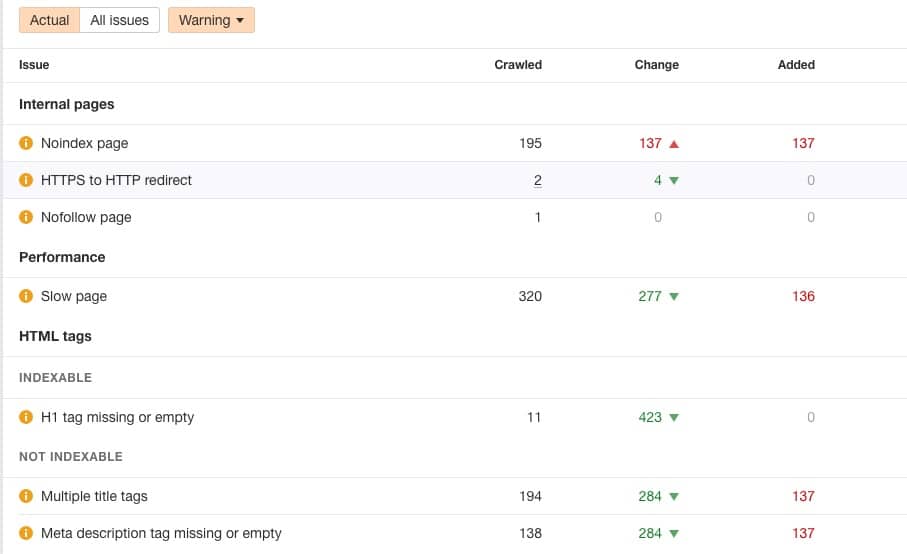
Improving starts with putting out important fires. Then, it’s moving on to putting out all fires. When the fires are out, then the focus shifts to rebuilding a strong structure that isn’t as susceptible to fires.
An audit helps provide the roadmap.

Accessibility – Site Speed Performance
Customers need to access your information and products. They don’t want to wait.
That’s why accessibility and website site speed performance is an important aspect of Technical SEO.
Customers access information on mobile devices, desktops, and tablets. Websites have more features, images, and information. Websites need to load all that information across all devices to connect customers with what they want. Quickly.
That’s a challenge. But when done right, speed rewards both the business and the customer. Just look at McDonald’s and fast food, or this case study with Pinterest (they improved mobile web home landing page performance by 60 percent and saw their mobile signup conversion rate improve by 40 percent).

We utilize three technical SEO tools to measure website performance: Google’s PageSpeed Insights, GTMetrix, and Ahrefs.
All three tools offer unique insights into the following areas on how to improve site speed.
- Rich media compression (Image optimization)
- Caching
- Server Optimization
- CDN
- Script compression
- Parallel downloads and minify
- CSS sprites
Google PageSpeed gives you insights straight from the source that matters the most. Their recommendations are broken down in Lab Data, Opportunities, and Diagnostics.

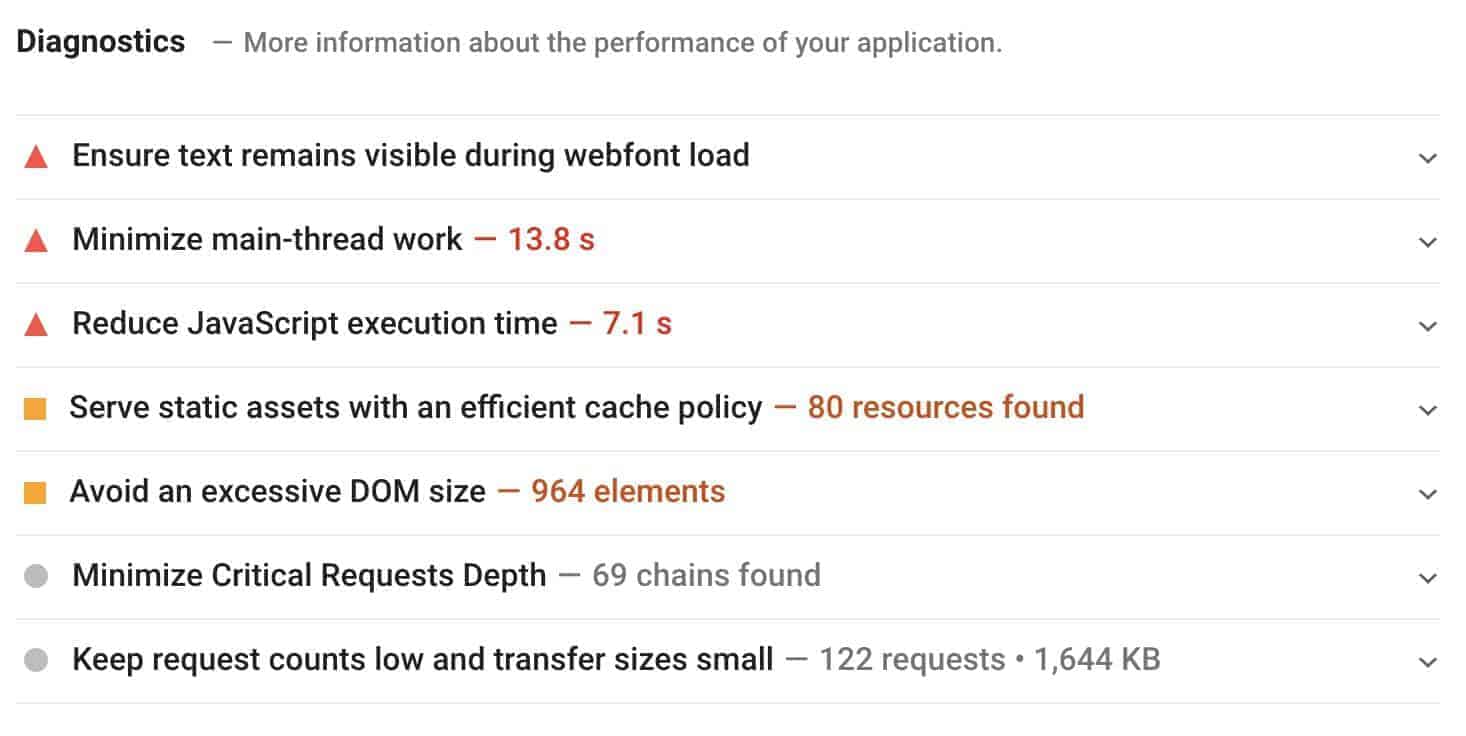
This is a screenshot from GTMetrix. You can see there are high-priority issues around serving resources, browser caching, and scaled images.
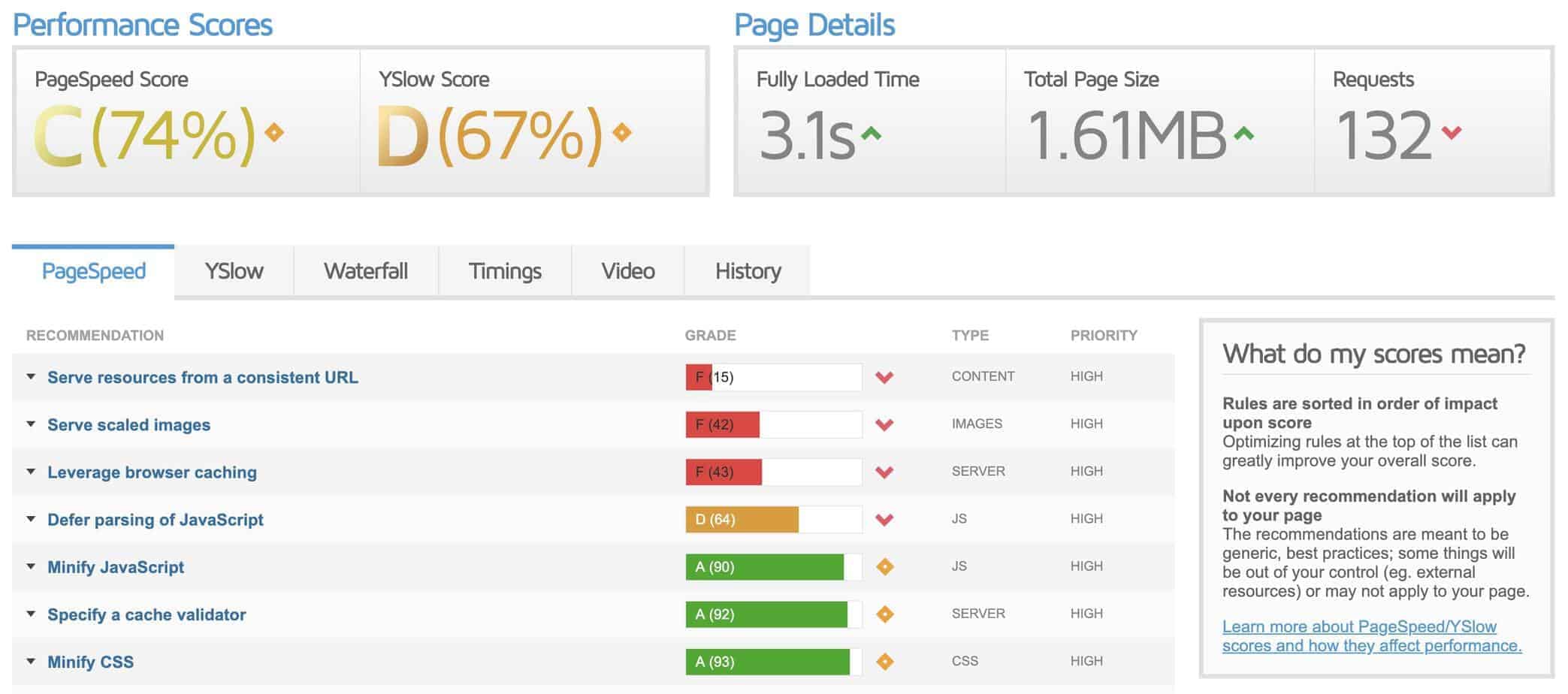
This screenshot is from Ahrefs. Their dashboard focuses on time to first byte and load time.
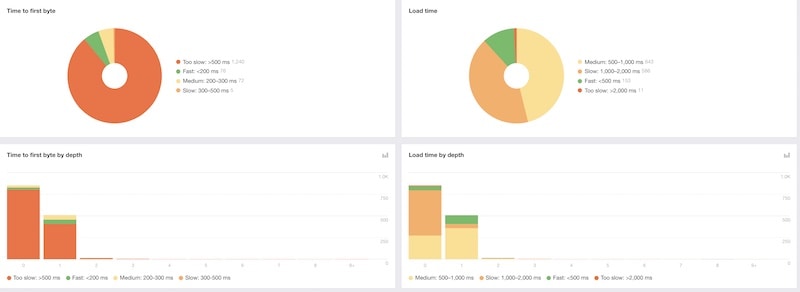
We use all of these tools to identify the high priority issues to improve performance. From there, we find and implement solutions to increase page speed so that customers are connected with your content faster.
Learn four ways to speed up a WordPress site in our article, Why Is My WordPress Site So Slow
HTML Tags
Missing, empty, or sub-optimal HTML tags are a missed opportunity to improve SEO.
At best, missing HTML tags are missed opportunities to get a customer to click on content from a search engine results page. At worst, HTML tags prevent content from reaching a search engine results page.
Here are some of the different types of HTML tags we analyze:
- Title Tags
- Meta Descriptions
- Header Tags (H1, H2, H3)
- ALT Tags
- Title Length
- Description Length
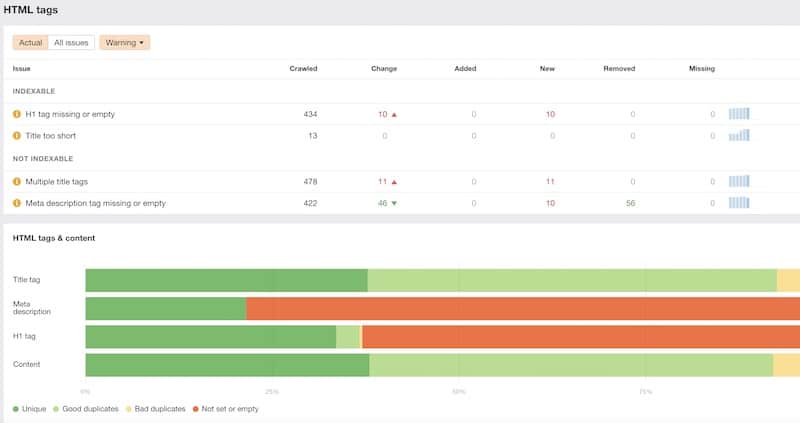
Conduct a free SEO audit to learn how HTML tags are displayed on your priority urls.
Content quality
Why is content quality important? Because content is what ranks in Google. If the content is not quality, it will not rank in search engine result pages.
Analyzing content detects issues that may be impacting quality. This includes common content quality issues like:
- Duplicate content
- Thin content
- Canonical Tags
- Entity Optimization
Here is an infographic with more details on content quality:
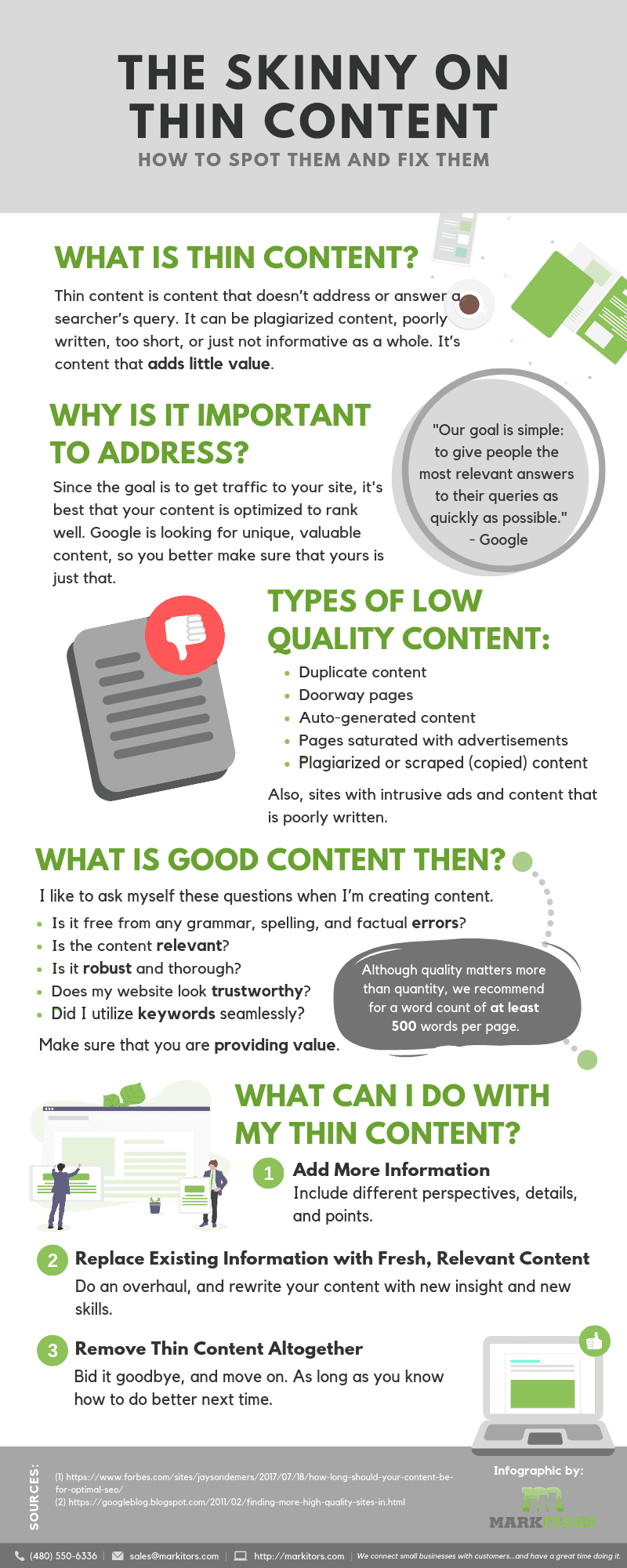
Get the full skinny on thin content.
Crawling & Indexing
SEO starts with a search engine visiting a website to discover content.
The visit a search engine makes to a site is called a “crawl.” The subsequent appearance of content in a search engine result page is called “indexing.” Together, crawling and indexing are the peanut butter and jelly of Technical SEO.
Common areas of crawling and indexing include analysis of:
- Site Structure: Internal Linking, URL structure, Taxonomy
- XML / HTML Sitemaps, Mobile Bot Crawl Behavior
- Robots.txt
- Status Codes 3xx, 4xx, 5xx
When something isn’t quite right with a website, the root cause typically falls within the crawling and indexing category.
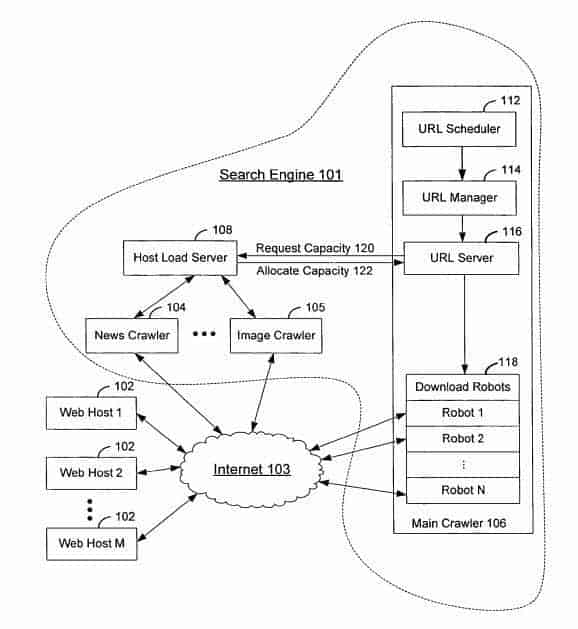
Source: USPTO Patent #10,742,398 by Google on Limiting requests by web crawlers to a web host
Other Important Technical SEO issues
We’ve hit on the key elements of Technical SEO with website performance, HTML tags, Content Quality, Crawling, and Indexing.
But, there are even more important factors to consider:
- Mobile: AMP, Responsive Design
- SSL: HTTPS
- Structured Data: Rich Snippets, Schema Markup, Microdata
- Migrations: HTTP to HTTPS, Domain Migrations, CMS Changes
- Rendering: Critical rendering paths / lazy loading, DOM rendering, Javascript Framework rendering
When you factor in all of these elements together, you collectively gather the focus of Technical SEO.
Quiz: What is Technical SEO?
Let’s Review
Here’s what we covered:
- What is Technical SEO
- Why is Technical SEO important
- Website Performance
- HTML Tags
- Content quality
- Crawling & Indexing
- Other important Technical SEO issues
- When you should use Technical SEO
That’s a lot of Technical SEO talk!
What’s Next?
Technical SEO is one element of search engine optimization, but there are also four other elements that we focus on here at Markitors: Strategy, Content, Digital PR, and Reporting.
If you would like to dive deeper into Technical SEO, we have compiled a “frequently asked questions” dropdown on our Technical SEO services page. These questions range from “what does a SEO company do?” to “what are your best practices?”
It’s worth a look.
There are a few areas on the web where you can go to learn about advanced Technical SEO.
- Google Patents
- The Anatomy of a Large-Scale Hypertextual Web Search Engine
- DistilledU Technical SEO Training Course (free)
- Technical SEO for Beginners (blog post)
Does that help explain what Technical SEO is? If so (or if not), contact us and we’d be happy to talk more.
Our technical SEOs have worked across some of the world’s mightiest brands and most complex sites. Their experience and knowledge has empowered them to optimize website structures and frameworks from the ground upwards and to deliver immense results based on analysis, recommendations and ongoing support. We’d be happy to help your brand too.




